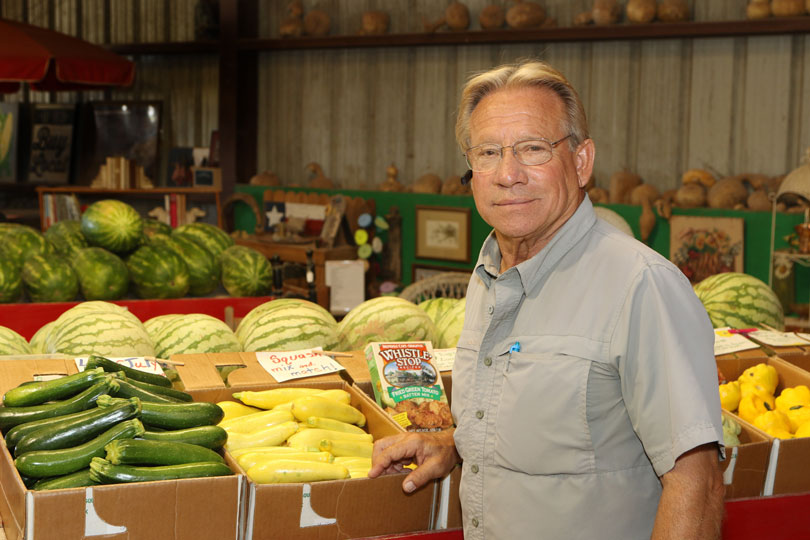By Jennifer Dorsett
Field Editor
A man leans against a dusty pickup truck, surveying the field before him. A full moon still shines overhead, but the light gradually shifts.
Suddenly, the sun peeks over the horizon. Moments later, golden rays of light bathe row after row of lush, leafy plants studded with sunshine-yellow blooms. And it’s clear to see how Sunburst Farms got its name.
“Most of the squash right now is really coming out,” Bernie Thiel, the owner of Sunburst Farms, said. “It just looks excellent.”
And he should know. His family has been growing vegetables on the High Plains for 80 years.
His father and four uncles moved to the Lubbock area from Idaho to grow potatoes, onions and cabbage. In the 1960s, Thiel started growing squash and zucchini, as well, and never looked back.
“I’ve basically been farming all my life,” Thiel said. “We’re close to 50 years being here on this particular farm we’re at right now.”
In addition to growing squash and zucchini commercially, Thiel’s family grows several acres of tomatoes, okra, cucumbers, bell peppers, jalapeños, long green chilies, beans, black-eyed peas, turnips, green beans and five different varieties of squash for a family-run produce market on the outskirts of Lubbock.
“We grow a mixture of other vegetables for a roadside market we’ve been running for just about as long as we’ve been farming,” he said. “We probably have eight to 12 different varieties of vegetables we grow and sell here.”
The squash crops get sold to grocery stores across Texas and the Southwestern U.S.
“We’re vertically integrated. We put it in the ground. We grow it. We pick it. We pack it. We store it, ship it in our 18-wheeler, get it to the stores where we want it to go, and I do all the marketing,” Thiel said. “We sell to just about all the different grocery stores and chains in Texas.”
And just like with any commodity crop, growing squash isn’t without its challenges.
“Of course, number one is weather. We actually got our first crop hailed out on our squash this year. I lost 40 acres of squash, and we were out almost four to six weeks of growing,” Thiel said. “Weather’s a big factor in growing the product here in West Texas. It’s a labor-intensive crop. We do a lot of hoeing to keep the vegetables clean, and each squash is picked by hand.”
Another issue he faces every year is labor.
“There’s always labor issues. Profit has gone down, because our labor force is mostly through H-2A now, and it’s expensive,” he said.
Thiel hires guest laborers through the H-2A Temporary Agricultural Workers program administered by U.S. Citizenship and Immigration Services (USCIS).
Under the H-2A program, U.S. employers must first apply for a temporary labor certificate from the U.S. Department of Labor and receive certification for H2-A laborers. Then, the employer must apply for another temporary labor form with USCIS to use foreign labor.
Once guest workers have been identified and selected, the employer must pay for their passage to and from their home country, provide housing for the laborers during their employment, guarantee a certain amount of work and pay the laborers a minimum wage of $12.23 an hour in Texas.
It’s not inexpensive, but Thiel said it’s the only way to obtain a reliable workforce to complete harvest.
“And then we have to contend with other countries flooding the market with cheaper product,” he said.
Mexico sells squash for much cheaper than it can be produced in the U.S., Thiel said.
“We usually start harvesting at the end of May and go until mid-October,” he said. “But a lot of it depends on when Mexico starts harvesting, because when they start harvesting, they flood the market. And it’s not productive to go ahead and keep harvesting then, because we cannot compete when they’re quoting squash half price of what you can sell it here in the states.”
But growing vegetables for people to eat is something Thiel takes seriously and will continue to do. Despite common misconceptions that conventionally-grown produce is doused in chemicals, he said that couldn’t be further from the truth.
“I want to sell you the best product, and you want the best product. We don’t cut corners,” he said. “We take this food home ourselves and eat it every night. Everything that we grow, we eat. We a

